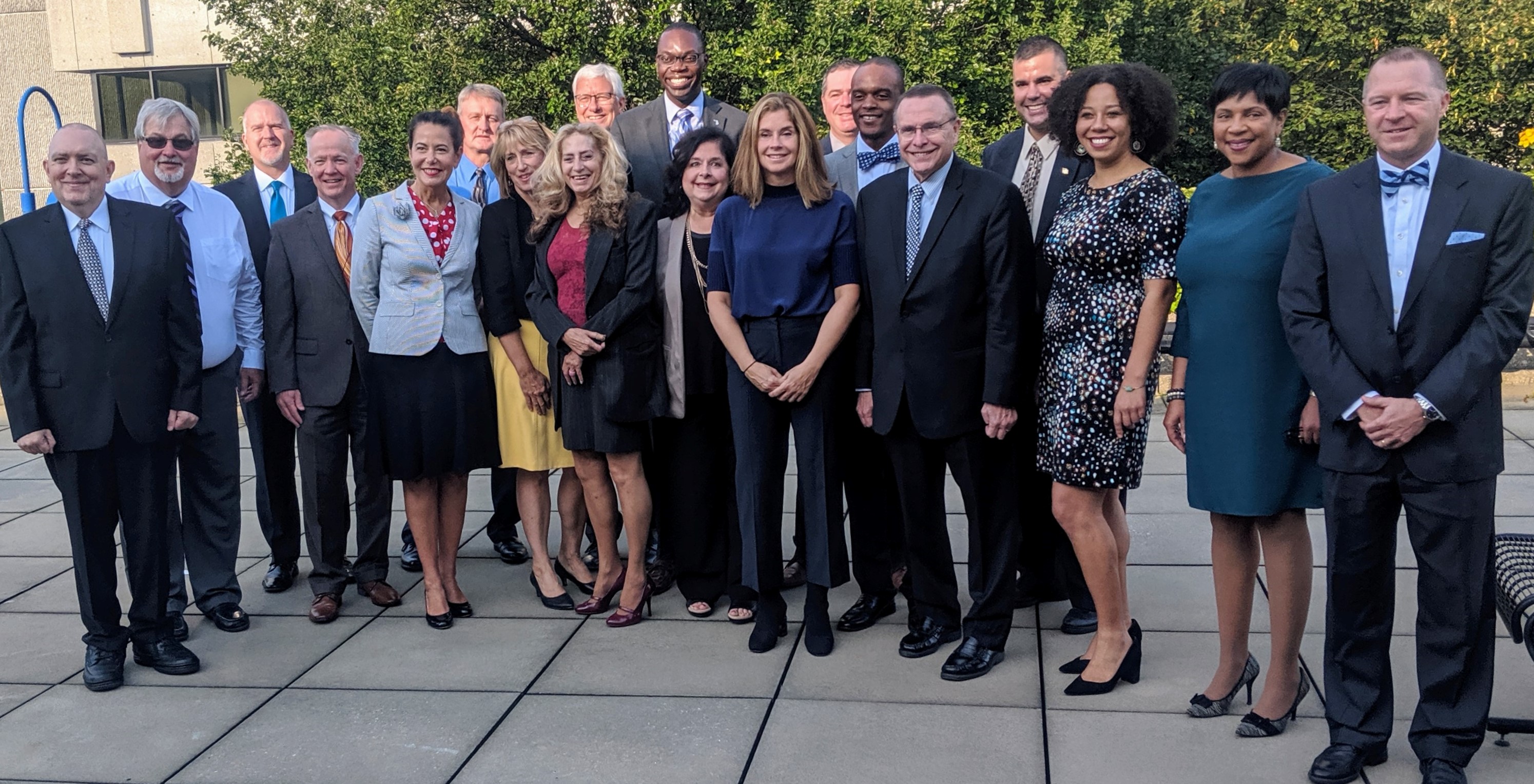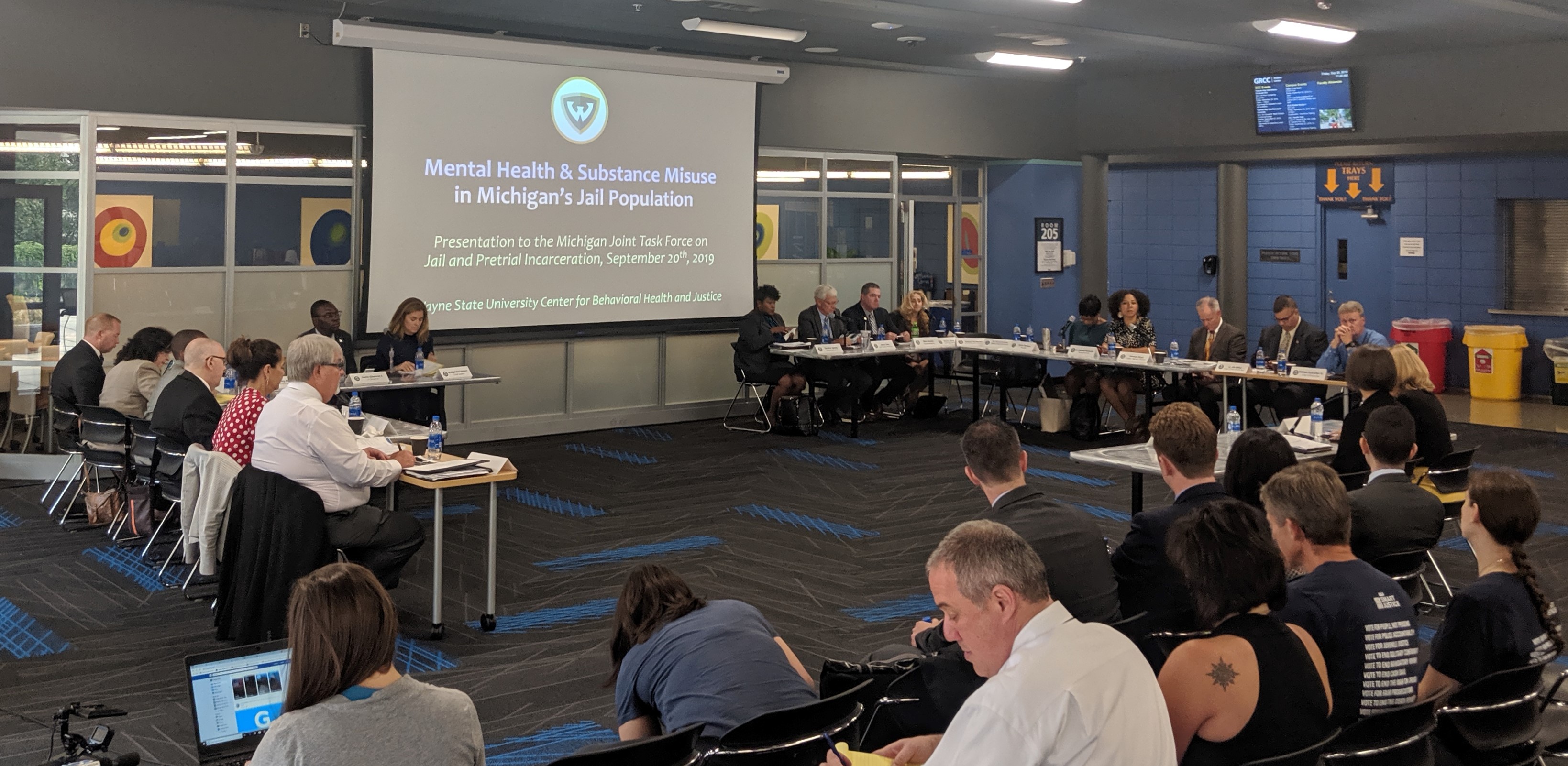WSU SSW Center for Behavioral Health and Justice presents to the Michigan Joint Task Force on Jail and Pretrial Incarceration during third Task Force meeting

September 20th, 2019 - Grand Rapids, Michigan
The Michigan Joint Task Force on Jail and Pretrial Incarceration had their third meeting on Friday, September 20th at Grand Rapids Community College in Grand Rapids, Michigan. The Task Force has been directed through executive order to use data and research to make recommendations for state-level changes in law and budgetary decisions that would expand alternatives to jail, safely reduce jail admissions and length of stay, support evidence-based pretrial decision-making, better align state laws with constitutional principles, and provide services and support to crime victims. Wayne State University (WSU) School of Social Work (SSW) Dean Sheryl Kubiak was appointed by Governor Whitmer to serve on the Task Force as a survivor of crime and an advocate for crime victims.
During the morning portion of the session, Task Force members were presented with data from Pew Charitable Trusts and the WSU SSW Center for Behavioral Health and Justice (CBHJ).
Analysis from Pew Charitable Trusts on Michigan arrests, court processing, and jail populations demonstrated that despite arrest numbers falling in the last decade, a significant number of arrests in Michigan are for low-level crimes-failure to appear was the most common arresting charge for last year. Additionally, 86% of cases in the statewide court data examined were misdemeanor offenses, many of which Pew staff and Chief Justice McCormack believed to be criminal traffic cases.
One prevailing theme that emerged from the analysis and subsequent questions from the Task Force was around Michigan's data systems, which are "not designed to lend themselves to statewide policy analysis," according to Pew analysts. Because courts, law enforcement agencies, county jails, and other institutions collect information about who passes through their system in different ways and store that information in different places, it is very difficult to get a clear and comprehensive picture of how all the pieces of the criminal/legal system fit together. Examples of this data include but are not limited to: demographics such as age and race; arresting charges; length of time spent in jail; and if a case concluded with a guilty verdict, plea, or dismissal.
Before breaking for lunch, SSW Dean Sheryl Kubiak and CBHJ Data Director Erin Comartin presented data analysis on mental health and substance misuse in Michigan's jail population, demonstrating that 33% of individuals booked into Michigan's jails in 2017 were identified as likely having a Serious Mental Illness (SMI), with rural jails having higher proportions of SMI compared to metropolitan or urban jails. Individuals with SMI spent more days in jail on average and were more likely to be sentenced to jail or prison compared those without SMI.

Concluding the presentation with policy considerations, the CBHJ discussed the benefits of improving mental health and substance abuse identification in jails through the use of standardized screening tools and training law enforcement officers in how to identify mental health issues. Trainings such as CIT were shown to improve officers' knowledge of psychiatric treatment and increase their de-escalation skills.
In the afternoon portion of the session, Task Force members heard public comment, providing residents of West Michigan communities to voice their thoughts and experiences with jail and pretrial incarceration directly to the Task Force.
Individuals from across the state and country gave testimony in support of reform, representing bail bondsmen, business interests, social justice, physical and behavioral healthcare, liberal policy, conservative policy, local courts, researchers, public defenders, community organizations, and many others. In addition, protecting the safety of victims of violent and sexual crimes, particularly child victims, emerged as a theme of public comment.
The Task Force will continue to hold public meetings across the state through November 2019, with public comment scheduled for each afternoon. The final report and recommendations of the Task Force are scheduled to be released at the January 9, 2020 meeting.
The next meeting is scheduled to take place on Friday, October 18 in Detroit. If you would like to stay connected with the Task Force, check the meeting schedule to identify the meeting nearest to you. Additionally, you can sign up for updates from the Task Force website, and view the list of Task Force members to connect with any of your elected officials serving as members.
About the Michigan Joint Task Force on Jail and Pretrial Incarceration: The Michigan Joint Task Force on Jail and Pretrial Incarceration was established by Governor Whitmer's Executive Order No. 2019-10. The Task Force acts in an advisory capacity with the goal of developing ambitious, innovative, and thorough recommendations for changes in state law, policy, and appropriations to expand alternatives to jail, safely reduce jail admissions and length of stay, and improve the efficiency and effectiveness of Michigan's justice systems. Learn more or sign up for the Task Force newsletter..
About the Center for Behavioral Health and Justice: The Center for Behavioral Health and Justice and Wayne State University's School of Social Work envisions communities in which research, data, and best practices are used by multiple stakeholders to enhance the optimal well-being of individuals with mental illness and/or substance use disorders who come into contact with the criminal/legal system. Learn more